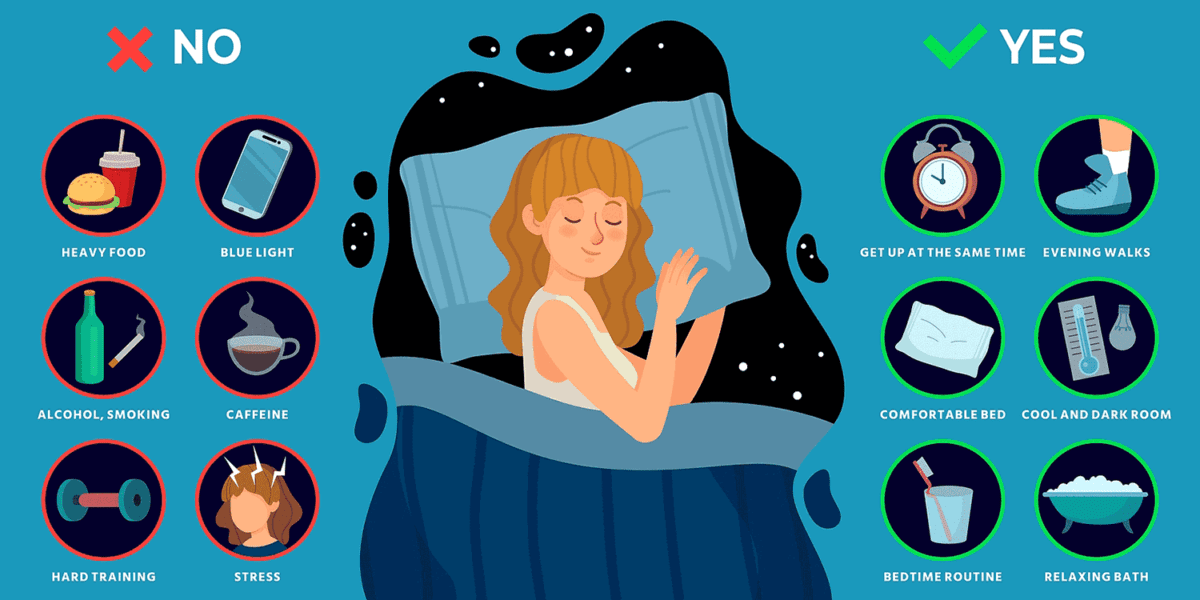Achieving a good night’s sleep is crucial for overall well-being and productivity. Here are some expert tips to help you improve the quality of your sleep, along with practical examples to make these tips more relatable.
1. Establish a Consistent Sleep Schedule: Maintaining a regular sleep-wake cycle helps regulate your body’s internal clock. Try to go to bed and wake up at the same time every day, even on weekends.
Example: If you usually wake up at 7 AM on weekdays, aim to go to bed around 10 PM. Consistency reinforces your body’s natural circadian rhythm, promoting better sleep.
2. Create a Relaxing Bedtime Routine: Engage in calming activities before bedtime to signal to your body that it’s time to wind down. This could include reading a book, taking a warm bath, or practicing gentle stretches.
Example: Instead of watching intense TV shows or scrolling through your phone, opt for activities that promote relaxation. This transition helps your mind shift from the day’s stressors to a more tranquil state.
3. Optimize Your Sleep Environment: Make your bedroom conducive to sleep by keeping it cool, dark, and quiet. Invest in a comfortable mattress and pillows to support a good night’s rest.
Example: Consider using blackout curtains to eliminate light disturbances, and use earplugs or a white noise machine if external sounds are disruptive. A comfortable sleep environment enhances the overall quality of your sleep.
4. Limit Exposure to Screens Before Bed: The blue light emitted by phones, tablets, and computers can interfere with your body’s production of the sleep-inducing hormone melatonin. Aim to turn off electronic devices at least an hour before bedtime.
Example: Instead of checking your phone right before bed, try reading a physical book or using a warm light for reading. This adjustment helps signal to your body that it’s time to wind down.
5. Watch Your Diet and Hydration: Avoid heavy meals, caffeine, and alcohol close to bedtime, as they can disrupt sleep. Instead, opt for a light snack if you’re hungry and stay hydrated throughout the day.
Example: Instead of having a large coffee in the evening, opt for a calming herbal tea. This subtle change can positively impact the quality of your sleep.
6. Get Regular Exercise: Engaging in regular physical activity can contribute to better sleep. However, try to complete vigorous workouts at least a few hours before bedtime.
Example: Consider incorporating activities like walking, jogging, or yoga into your daily routine. Exercise can help reduce stress and improve the overall quality of your sleep.
7. Manage Stress and Anxiety: Practice relaxation techniques such as deep breathing, meditation, or mindfulness to manage stress. Chronic stress and anxiety can significantly impact sleep quality.
Example: If you find it challenging to unwind, try a simple deep breathing exercise. Inhale deeply for a count of four, hold for four counts, and exhale for four counts. This can be done before bedtime to calm the mind.
8. Limit Naps During the Day: While short naps can be beneficial, especially for a quick energy boost, avoid long or irregular napping during the day. This can interfere with your nighttime sleep.
Example: If you feel the need for a nap, keep it short—around 20-30 minutes—and try to schedule it earlier in the day to avoid disrupting your regular sleep patterns.
9. Be Mindful of Your Sleep Position: Pay attention to your sleeping posture, as it can affect the quality of your sleep. Optimal sleeping positions support proper spinal alignment and reduce discomfort.
Example: If you’re a back sleeper, consider using a pillow to support the natural curve of your neck. Experiment with different pillow types and mattress firmness to find what works best for you.
10. Seek Natural Light Exposure: Exposure to natural light during the day helps regulate your body’s internal clock. Aim for at least 30 minutes of sunlight exposure, especially in the morning.
Example: Take a short walk outside during your lunch break or spend some time near a window. Natural light exposure enhances your alertness during the day and improves sleep quality at night.

Read Also Circuit Training: The Key to Unlocking Your Fitness Potential
11. Consult a Healthcare Professional if Needed: If you consistently struggle with sleep despite making lifestyle changes, consider seeking advice from a healthcare professional. They can identify potential sleep disorders or underlying health issues.
Example: If persistent insomnia or sleep disturbances affect your daily life, consult with a sleep specialist or your primary care physician. They can provide personalized recommendations based on your unique situation.
12. Avoid Clock Watching: Constantly checking the clock during the night can create stress and anxiety about sleep. Turn the clock away or place it out of sight to reduce the temptation to check the time.
Example: Instead of staring at the clock when you wake up in the middle of the night, focus on relaxing activities like deep breathing or visualization to help you fall back asleep more easily.
13. Establish a “Wind Down” Period: Allocate time before bed for activities that help signal to your body that it’s time to wind down. This could include dimming the lights, listening to soothing music, or practicing a calming pre-sleep ritual.
Example: Rather than engaging in stimulating activities like work emails, try reading a calming book or practicing gentle stretches. This transition prepares your mind for a restful night’s sleep.
14. Invest in Quality Bedding: Your mattress, pillows, and bedding play a significant role in your sleep comfort. Invest in quality bedding that provides proper support and aligns with your sleep preferences.
Example: Consider upgrading your pillows if they no longer provide adequate support. A comfortable sleep environment contributes to better sleep quality and overall well-being.
15. Mind Your Sleep Posture: Pay attention to your sleep posture to prevent discomfort and promote better sleep. The ideal sleeping position varies from person to person, so find what works best for you.
Example: If you’re a side sleeper, use a pillow to support the space between your neck and shoulder. Experiment with different positions to discover the one that minimizes any discomfort during the night.
16. Create a Tech-Free Zone: Designate your bedroom as a tech-free zone to minimize screen time and the associated blue light exposure. This helps create a serene environment conducive to sleep.
Example: Instead of scrolling through your phone before bed, leave electronic devices outside the bedroom or establish a charging station away from the bed. This promotes a peaceful atmosphere that encourages rest.
17. Practice Gratitude or Journaling: Reflecting on positive aspects of your day or jotting down your thoughts in a journal can be a therapeutic way to clear your mind before sleep.
Example: Keep a gratitude journal by your bedside and jot down three things you’re grateful for each night. This simple practice can shift your focus from stressors to positive aspects, promoting a more relaxed state of mind.
18. Consider Aromatherapy: Certain scents, like lavender, chamomile, or jasmine, are known for their calming properties. Experiment with aromatherapy using essential oils or scented candles to create a soothing bedtime atmosphere.
Example: Use a diffuser with lavender essential oil in your bedroom before bedtime. The calming aroma can signal to your brain that it’s time to relax, promoting a more tranquil sleep environment.
19. Limit Fluid Intake Before Bed: Minimize the consumption of liquids, especially caffeine and alcohol, close to bedtime to reduce the likelihood of disruptions due to bathroom visits during the night.
Example: Instead of having a large glass of water right before bed, hydrate earlier in the evening and keep a small glass of water by your bedside in case you get thirsty during the night.
20. Celebrate Small Wins: Acknowledge and celebrate small improvements in your sleep routine. Positive reinforcement can motivate you to continue adopting healthier sleep habits.
Example: If you manage to stick to your bedtime routine for a week, treat yourself to a relaxing weekend activity. Recognizing your efforts can contribute to a positive mindset and reinforce healthy sleep patterns.
Remember, the key to a good night’s sleep lies in creating a personalized routine that aligns with your preferences and lifestyle. Consistency and a mindful approach to your sleep habits can lead to long-lasting improvements in the quality of your rest. Sweet dreams and a well-rested life ahead!
